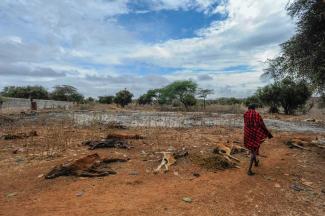Kenya
How Kenya is affected by climate injustice
 picture-alliance/AA/Gerald Anderson
picture-alliance/AA/Gerald Anderson
Africa is the world’s second largest continent – and yet it today accounts for less than four percent of global emissions, according to the International Energy Agency (IEA), and almost zero percent of historical emissions.
Climate justice demands that those responsible for causing the crisis must be held accountable, and those most affected must get adequate support to adapt to the problems and mitigate them.
I come from a small town in western Kenya called Iten. Agriculture is the backbone of my community’s economy. My siblings and I had it easy at school because our parents could sell their farm produce after the harvest season to supplement the income from their day jobs and thus never struggled to pay our school fees. In schools in rural Kenya, sometimes parents have the option to provide food (a bag of maize and beans) for the school meals instead of paying the full amount of school money. This is supposed to help them pay the subsidised fees. However, last year, for example, they lacked crop to do so because of delayed rains.
Weather patterns have changed drastically in Kenya, threatening our most important livelihood. Our country depends on rain-fed agriculture. Farmers keep suffering losses due to the unpredictable weather conditions. They have no one to turn to for compensation and they do not know enough about the impacts of the climate crisis to try to address it.
Northern Kenya is currently suffering from a drought that is causing massive cattle deaths. Livestock is the main source of income for the pastoralist communities living in this region. As a result, we now see children suffering from malnutrition on a daily basis, women travelling miles to find water for their families and families taking turns to eat in shifts, doing their best to cope with food insecurity.
In many parts of the country, on the other hand, the rainy season brings the threat of raging floods and with it the loss of shelter, disease and death, rather than the prospect of a successful harvest.
Climate justice requires a number of changes at global and national levels. For example, we need a paradigm shift from energy systems based on fossil fuels to more sustainable and renewable energies such as wind and solar power.
According to the International Trade Administration, a US government agency, Kenya’s electric power use is 81 % renewable energy. In transport and household usage, including fires for cooking, there is still much room for improvement. Most Kenyans use wood, dung, charcoal or kerosene for cooking. Measures for clean and efficient household energy would therefore benefit both health and the environment by generating more renewable energy for electricity that can be used for cooking and other household purposes. Lacking funds are the main bottleneck here. Africa has great potential for the generation and provision of renewable energy, but this can only be tapped if the corresponding financial resources are made available.
Communities are at the forefront of climate change
Over the years, we have failed to implement policies and regulations that hold companies and governments accountable for emissions and the resulting climate damage. Action has become more urgent than ever. The communities at the forefront of climate change continue to suffer extreme weather disasters, with little or no ability to recover. The lack of accountability and delivery on promises made at global climate summits is compounding the problems.
One of the pressing challenges in Kenya is the unequal distribution of resources, which leaves many communities vulnerable. For communities to cope, we need more investment in infrastructure, such as water-storage systems and irrigation.
There is also a need for greater investment in education and training. Communities must understand the impacts of climate change in order to see how they can deal with them. It is problematic that they have always been portrayed as victims rather than agents of change. It is imperative to empower and educate those who are disproportionately affected, including women and other marginalised groups.
Climate fear among the youth
The young generation has currently inherited the worst effects of the climate crisis due to the inaction of the older generation. Countless young people suffer from climate anxiety because they do not know what the future will actually look like. Policy frameworks have proven to be inefficient and insufficient when it comes to creating a safe planet and a world worth living in for this generation and, even worse, for the generations to come. Those who have made profits from fossil-fuel development do not have to live with its consequences as long as we young people do.
As far as the United Nations Framework Convention on Climate Change (UNFCCC) process is concerned, progress was made at the UN Climate Summit in Egypt with the establishment of a loss and damage fund. But it cannot stop there.
We need a mechanism to ensure that the outcome of the two major collective goals of past climate summits – the old pledge by high-income countries to mobilise $ 100 billion annually to support low- and middle-income countries and the new loss and damage fund – are accessible to the vulnerable communities that need them most.
Climate justice means that the high-income countries responsible for this crisis finally deliver on their promises. They must provide the financial resources we need to adapt and transition to a green economy with sustainable livelihoods. Climate justice means that policymakers fully recognise that climate impacts exceed the capacity of many communities to adapt – and show real solidarity by ensuring that funding flows to communities like mine.
Abigael Kima is a Kenyan climate justice activist and host and producer of the Hali Hewa Podcast.
abigaelkima@gmail.com

